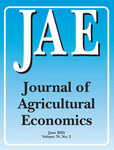Overview
Against the backdrop of significant and fundamental changes in European agri-food industries and rural areas, EuroChoices was launched in 2001 as a vehicle for dissemination of the latest research, ideas and policy deliberations on agri-food and rural resource issues. It aims to bring careful reasoning with an economic underpinning to the debates and options surrounding these issues and to present in-depth, evidence-based arguments and research findings in an accessible format to both a technical and non-technical audience. Distinguished authors and decision-makers are regularly invited to contribute to EuroChoices. This ensures that the debates and decision-making process which guides and forms Europe's agri-food and rural resource policies and practices are brought directly to the reader, thus making it essential reading for policy-makers, corporate planners, farmers, environmentalists, industrialists, NGOs, academics and students. In addition to the main topical research articles, each issue contains other interesting features: 'Counterpoints and Reply', 'Parlons Graphiques' (Let's talk graphs) and 'Point de Vue' (Point of view); all with summaries written in English, French and German.
Aims and Scope
EuroChoices is a full colour, peer reviewed, outreach journal of topical European agri-food and rural resource issues, published three times a year in April, August and December. Its main aim is to bring current research and policy deliberations on agri-food and rural resource issues to a wide readership, both technical and non-technical.
The need for this is clear – there are great changes afoot in the European and global agri-food industries and rural areas, which are of enormous impact and concern to society. The issues which underlie present deliberations in the policy and private sectors are complex and, until now, normally expressed in impenetrable technical language.
Each issue of EuroChoices brings you in-depth, evidence-based arguments or research findings, normally with an economic underpinning, fully referenced and summarised in English, French and German. This means that you have instant, plain-language access to contemporary thinking and research, with all the technical details unobtrusively available.
We want to make you party to – and a part of – the debate and decision-making process which guides and forms European and wider agri-food and rural resource policies and practices. To this end, we regularly invite distinguished authors and decision-makers to contribute to EuroChoices.
You are invited to enter the debate by contributing a 'Main Article', 'Point de Vue', 'Counterpoint', 'Parlons Graphiques', or by simply writing a Letter to the Editor. For submission guidelines, see: Author Guidelines.
Cliquez ici pour lire ce texte en francais. | Bitte klicken Sie hier, um dieses Text auf Deutsch zu lesen.
Keywords
Agriculture, economics, rural resources, food.
Abstracting and Indexing Information
- AgBiotech News & Information (CABI)
- AgBiotechNet (CABI)
- Biofuels Abstracts (CABI)
- CAB Abstracts® (CABI)
- CABDirect (CABI)
- Dairy Science Abstracts (CABI)
- EconLit (AEA)
- Emerging Sources Citation Index (Thomson Reuters)
- Field Crop Abstracts (CABI)
- Forestry Abstracts (CABI)
- GEOBASE (Elsevier)
- Global Health (CABI)
- Index Veterinarius (CABI)
- InfoTrac (GALE Cengage)
- Leisure Tourism Database (CABI)
- Leisure, Recreation & Tourism Abstracts (CABI)
- Maize Abstracts (CABI)
- Nutrition Abstracts & Reviews Series B: Livestock Feeds & Feeding (CABI)
- Pig News & Information (CABI)
- Plant Breeding Abstracts (CABI)
- Plant Genetic Resources Abstracts (CABI)
- Postharvest News & Information (CABI)
- RePEc: Research Papers in Economics
- Rural Development Abstracts (CABI)
- SCOPUS (Elsevier)
- Soils & Fertilizers Abstracts (CABI)
- Soybean Abstracts Online (CABI)
- Sugar Industry Abstracts (CABI)
- Tropical Diseases Bulletin (CABI)
- Veterinary Bulletin (CABI)
- Web of Science (Thomson Reuters)
- World Agricultural Economics & Rural Sociology Abstracts (CABI)





-1641898166.jpg)
